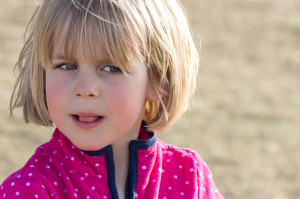Parenting a Cautious Child and Keeping Your Sanity
By Jessa McClure

Disney music shouted at us from a speaker in the ceiling, barefooted children ran circles around our bodies like they were inanimate objects, and a toddler sat crying inside of an inflatable castle. I looked down at my daughter as she surveyed the scene, and I could tell it was going to be one of those days.
She was not going to participate. She was going to sit fearfully while her friends jumped happily inside bounce houses and slid down giant, colorful slides.
We began the trip to the indoor inflatable playground with the hope that she would see others having fun and would join in, but the more we talked up the experience and the more we pushed her to just "get over it," the more she revolted and retreated to the safety of her shell.
I could see the veins in my husband's skull pulsing with frustration and embarrassment as she clung to a folding chair in the back of the room. Why was she like this? What did I do wrong?
I began to seek the answers to my questions and the solution to our cautious child problems, and what I found surprised me.
Being cautious is part of who she is
Every child is born with a specific temperament. They have no more control over the temperament they are gifted with than they do over the color of their eyes. A child with a cautious temperament is more likely to think through situations before they act because they are carefully observing their environment, according to the National Center for Infants, Toddlers and Families.
She needs time to adjust to new situations
Cautious children are often more affected by changes in their environment. If you introduce a new car seat or babysitter, they are likely to rebel against this new change with a lot of protest and emotional outbursts. Establishing routines and expectations are important for cautious kids. It gives them a sense of control.
Look for patterns in her behavior
Are there certain times of the day, places or people that are harder for your child to deal with? Some cautious or slow-to-warm-up children are more comfortable playing with just a few children in someone's home, as opposed to a noisy playground filled with children. Try to anticipate these nerve-wracking situations and prepare your child ahead of time. Knowing what's going to happen next is essential for giving cautious children the security they need to branch out and take bigger risks.
Support and encourage her attempts to leave her comfort zone
Try to avoid becoming visibly frustrated or disappointed with your child's cautious behavior. She doesn't want to let you down. She can't help the way she feels about these out-of-control scenarios. And when she does take a chance and climb into the bounce house meant for infants, give her a pat on the back and tell her how proud you are. There's nothing like positive affirmation to give a child the confidence they need to take bigger risks next time.
Back To Top
